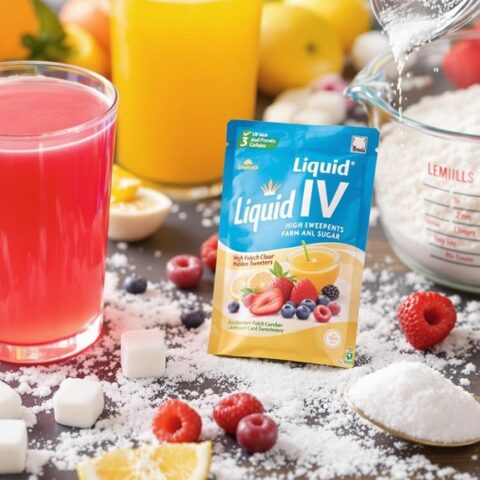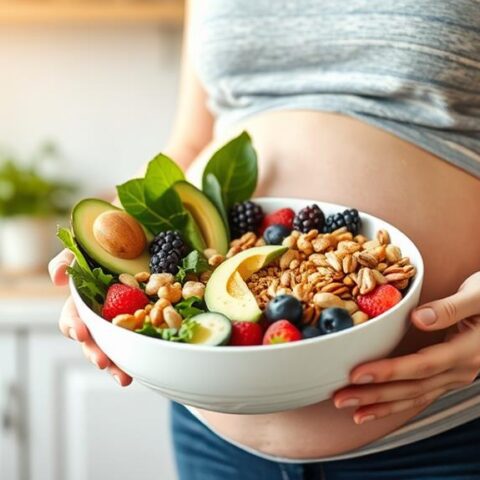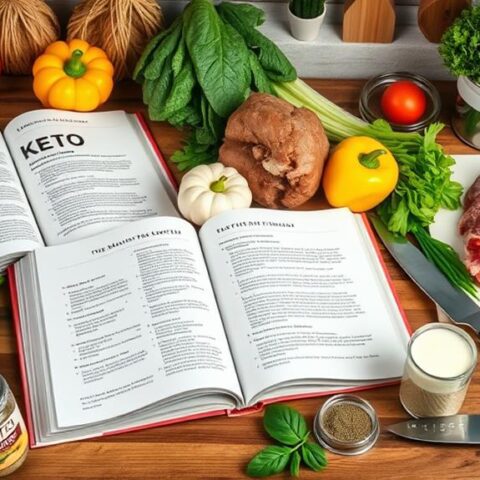
Determining if coconut water is keto-friendly involves scrutinizing its carbohydrate content. Coconut water contains approximately 9 grams of carbohydrates per 100 ml, particularly from natural sugars, which can impact a stringent ketogenic diet that typically limits daily carb intake to 20-50 grams. Although it aids in hydration with its rich electrolyte content, careful portion control is imperative to maintain ketosis. Consuming less than 100 ml can fit some keto plans, but alternatives with lower carbs may be more suitable. A detailed exploration into its implications for diet balance can provide greater understanding of its role in a keto regimen.
Key Takeaways
- Coconut water has 9 grams of carbs per 100 ml, impacting keto carb limits.
- Net carbs are approximately 6.4 grams per 100 ml after fiber deduction.
- Consuming small portions can fit within a 40-gram daily carb allowance.
- Electrolyte benefits are useful, but moderation is key for keto compatibility.
- Coconut water alternatives include herbal teas and coconut milk with fewer carbs.
Understanding Keto Diet Basics
A ketogenic diet, often referred to as a "keto" diet, is a high-fat, low-carbohydrate nutritional strategy designed to shift the body's primary energy source from carbohydrates to fats. This dietary approach requires stringent attention to carb intake, typically limiting consumption to between 20-50 grams per day to initiate and maintain a state of ketosis.
Ketosis is a metabolic condition where the body efficiently burns fat for fuel instead of glucose derived from carbohydrates. The change to ketosis can take 3-4 days, during which individuals may experience symptoms like increased thirst and fatigue as their bodies adjust.
The macronutrient distribution within the keto diet generally comprises 70-80% of total caloric intake from fats, 15-25% from protein, and a mere 5-10% from carbohydrates. This necessitates meticulous monitoring of food and beverage choices to guarantee compliance with the carb intake threshold, thereby fostering the desired metabolic state.
Foods rich in fats are prioritized, while most fruits, grains, and sugars are minimized due to their high carbohydrate content. Understanding the nutrition facts of coconut, including its carbohydrate profile, is vital for those on a keto diet.
Coconut Water Nutritional Breakdown
Understanding the nutritional profile of coconut water is important for those adhering to a ketogenic diet due to its carbohydrate content. Coconut water contains approximately 9 grams of carbohydrates per 100 ml serving, primarily derived from natural sugars, which account for about 6.3 grams. This carbohydrate content can be a significant factor for individuals following a ketogenic diet, as it may impact the ability to maintain ketosis.
It is vital to monitor carbohydrate intake to avoid interfering with the steady blood sugar levels that the ketogenic diet is known to support. In addition to its carbohydrate composition, coconut water provides 1.7 grams of protein and 0.5 grams of total fat per 100 ml serving. While these macronutrients contribute minimally to daily intake, they are essential to take into account when evaluating the overall nutritional benefits of coconut water within a ketogenic context.
The dietary fiber content is approximately 2.6 grams per 100 ml, slightly reducing the net carbohydrates, which is vital for those monitoring net carb intake.
Importantly, coconut water is rich in electrolytes, offering 600 mg of potassium and 252 mg of sodium per 100 ml. These electrolytes enhance coconut water's hydrating properties, which can be beneficial for maintaining electrolyte balance, especially on a ketogenic diet known for its diuretic effects.
Carbohydrate Content Analysis
Coconut water's carbohydrate composition plays an essential role in determining its compatibility with a ketogenic diet. Coconut water contains around 9 grams of carbohydrates per 100 ml serving. For individuals adhering to a strict ketogenic diet, the carbohydrate intake is typically restricted to between 20-50 grams per day.
Therefore, the carbohydrate content in coconut water necessitates careful consideration. Specifically, the net carb content, which stands at approximately 6.4 grams per 100 ml, is a vital factor. This figure accounts for the dietary fiber, which is 2.6 grams, thereby providing a more accurate depiction of its impact on blood glucose levels.
The shift to fat burning in ketosis is essential for maintaining energy levels while on a keto diet, and keeping carb intake low is critical to achieving this state. Considering that a standard cup (240 ml) of coconut water can contribute notably, potentially accounting for one-third of the daily carbohydrate limit on a ketogenic regimen, moderation is key.
For individuals targeting a lower carbohydrate intake of 30-40 grams per day, incorporating coconut water into their diet is feasible but requires strategic planning. The net carb content must be balanced with other low-carbohydrate food sources to prevent exceeding the daily limit.
This highlights the importance of monitoring and managing overall carbohydrate intake to maintain ketosis effectively while allowing for occasional coconut water consumption.
Impact of Natural Sugars
Examining the carbohydrate content of coconut water naturally leads to a consideration of the impact of natural sugars on a ketogenic diet.
Coconut water contains approximately 6.4 grams of net carbohydrates per 100 ml, primarily stemming from natural sugars. This poses a challenge for individuals adhering to a keto diet, where maintaining low carbohydrate intake is essential for sustaining ketosis.
For those aiming to stay within the daily carb limit of 20-50 grams, consuming coconut water can greatly impact this threshold. The natural sugars in coconut water contribute considerably to its carbohydrate content, necessitating careful monitoring by those on a keto diet.
While coconut water offers beneficial nutrients such as potassium and magnesium, its natural sugar content may hinder strict compliance with keto guidelines if consumed excessively.
Therefore, individuals must account for these sugars within their daily carb calculations to avoid disrupting ketosis.
Electrolytes and Hydration Benefits
Coconut water serves as an effective source of electrolytes, providing essential nutrients like potassium and sodium, which are important for maintaining hydration and electrolyte balance, particularly for those following a ketogenic diet.
The beverage's natural electrolyte composition is beneficial for replenishing fluids lost during physical activity, supporting muscle function and preventing dehydration-related issues such as cramps and fatigue.
For keto dieters, monitoring electrolyte intake is necessary to prevent symptoms like muscle cramps and headaches.
However, while its low-calorie and hydrating properties are advantageous, consideration of its natural sugar content is important for those adhering to the strict carbohydrate limits of a keto regimen.
Electrolyte Replenishment Importance
Electrolyte replenishment plays an essential role in maintaining ideal hydration and overall physiological function, particularly during physical activity or dietary shifts such as adopting a ketogenic diet. During such changes, the body's carbohydrate intake decreases, which often leads to a reduction in glycogen stores and, consequently, a loss of water and electrolytes. Coconut water, rich in electrolytes, offers a natural solution to counter these effects, providing approximately 600 mg of potassium and 252 mg of sodium per cup. These electrolytes are vital for fluid balance and muscle function, helping to prevent imbalances that may cause cramps, fatigue, and headaches.
The composition of coconut water aligns closely with human plasma, enhancing its effectiveness for hydration and electrolyte replenishment post-exercise. Unlike high-calorie sports drinks, coconut water supports hydration without disrupting ketosis due to its low-calorie and low-carbohydrate content. This makes it an appealing choice for those on a ketogenic diet seeking to maintain electrolyte balance.
| Nutrient | Coconut Water Content (per cup) |
|---|---|
| Potassium | 600 mg |
| Sodium | 252 mg |
| Calories | Low |
| Carbohydrates | Minimal |
| Hydration Benefit | High |
Incorporating coconut water into a ketogenic regimen can therefore assist in managing hydration and electrolyte needs effectively.
Hydration During Keto Diet
Steering through the intricacies of a ketogenic diet involves understanding the vital role hydration plays, particularly given the diet's tendency to prompt increased water and electrolyte loss. The shift to ketosis often accelerates the excretion of fluids, leading to a greater need for staying hydrated.
Coconut water emerges as a supportive option due to its rich electrolyte profile, containing 600 mg of potassium and 252 mg of sodium per cup. These electrolytes are essential in counteracting the potential imbalances that can cause muscle cramps and fatigue, common symptoms during the initial stages of a keto regimen.
The hydrating benefits of coconut water are particularly valuable post-exercise, aiding recovery by replenishing lost fluids and supporting muscle function.
Despite these advantages, it is important to be mindful of its carbohydrate content. Coconut water does contain carbs, which can impact the strict limits required for maintaining ketosis.
As a result, while it serves as an effective means to stay hydrated and replenish electrolytes, careful consideration of its carb contribution is necessary. This guarantees that coconut water can be strategically integrated into a keto diet, maximizing its benefits while adhering to dietary constraints.
Balancing Sugar Content
While coconut water presents significant advantages regarding hydration and electrolyte replenishment, its sugar content necessitates careful consideration within a ketogenic framework. Coconut water contains approximately 9 grams of carbohydrates per 100 ml, with about 6.4 grams as net carbs, posing a challenge for those adhering to strict keto guidelines. Given that ketogenic diets typically restrict daily carbohydrate intake to around 20-50 grams, the natural sugars in coconut water can potentially disrupt ketosis if consumed in excess.
Despite its carbohydrate content, coconut water is rich in electrolytes, such as potassium and sodium, which are vital for maintaining muscle function and preventing cramps. A single cup provides 600 mg of potassium and 252 mg of sodium, making it an effective option for replenishing electrolytes lost during exercise.
However, the balance between hydration benefits and carbohydrate intake is essential. To incorporate coconut water in a keto-friendly manner, individuals must account for its carbohydrate content within their daily carb allowance. This requires careful measurement and moderation, ensuring that the benefits of hydration and electrolyte support do not compromise the primary objective of maintaining ketosis.
Balancing these aspects is key to optimizing health on a ketogenic diet.
Evaluating Keto Compatibility
Considering the role of carbohydrates in a ketogenic diet, it is imperative to assess the compatibility of coconut water with keto guidelines. Coconut water contains approximately 9 grams of carbohydrates per 100 ml, which is a significant factor when evaluating its impact on daily intake.
The ketogenic diet typically restricts daily carbohydrate consumption to between 20 and 50 grams to maintain ketosis. To sustain ketosis and fat burning, it is essential to monitor carbohydrate intake closely. Consequently, incorporating coconut water into a keto meal plan requires careful consideration of its carb content relative to the diet's strict limits.
For individuals following a keto diet with a carb allowance of up to 40 grams, the inclusion of coconut water demands precise tracking of their daily intake. Consuming coconut water may fit within this framework if other dietary choices are adjusted to accommodate its carbohydrate contribution.
However, those adhering to more stringent carbohydrate limits might find that even a small portion of coconut water could challenge their ability to maintain ketosis.
Moderation and Portion Control
When incorporating coconut water into a ketogenic diet, attention to portion size is essential to prevent exceeding daily carbohydrate limits.
Monitoring carb intake meticulously guarantees that coconut water consumption does not disrupt ketosis, especially given its relatively high carb content per serving.
Balancing coconut water intake with other low-carb foods can help maintain overall dietary goals while still enjoying this hydrating beverage.
Portion Size Awareness
Portion control plays a significant role in incorporating coconut water into a ketogenic diet due to its carbohydrate content. With coconut water containing approximately 9 grams of carbohydrates per 100 ml, portion size awareness is essential to maintain ketosis. For those adhering to a strict keto diet with a daily carb limit of 40 grams, consuming less than 100 ml of coconut water is advisable to prevent exceeding carbohydrate thresholds.
Given that one cup (240 ml) of coconut water can contribute nearly one-third of this allowance, meticulous attention to serving sizes becomes vital.
Awareness of portion sizes is a key strategy in managing carbohydrate intake from coconut water. Utilizing tools such as a measuring cup or food scale can effectively aid in precisely determining servings, thereby facilitating a balance between the hydration benefits of coconut water and the constraints of carbohydrate content.
This awareness can prevent inadvertently surpassing the 50-gram daily carbohydrate limit common in ketogenic regimens. By practicing portion control, individuals can enjoy the nutritional advantages of coconut water without compromising their ketogenic goals, ensuring that their carbohydrate intake aligns with dietary objectives.
Carb Intake Monitoring
Understanding portion size is essential to effectively incorporating coconut water into a ketogenic diet, but it is equally important to monitor overall carbohydrate intake to maintain ketosis. The keto diet typically restricts daily carbohydrate consumption to between 20-50 grams to sustain ketone production. Coconut water, containing approximately 9 grams of net carbs per 240 ml serving, can greatly impact this carbohydrate limit. As a result, carb intake monitoring becomes critical for those adhering to a strict keto diet.
To enjoy coconut water without compromising ketosis, portion control is imperative. Opting for smaller servings, such as 100 ml, reduces the carb intake to about 3.75 grams, making it easier to fit within the daily carbohydrate allowance. This practice allows individuals to benefit from the hydration properties of coconut water while maintaining dietary compliance.
Moreover, vigilant tracking of carbohydrates from all dietary sources, including coconut water, is essential to guarantee total consumption does not exceed 50 grams per day. By consistently monitoring carb intake and practicing portion control, individuals can make informed decisions, integrating coconut water into their keto diet without disrupting ketosis.
This strategic approach supports continued adherence to ketogenic nutritional goals.
Balance With Other Foods
Balancing coconut water consumption with other low-carb foods is essential for maintaining ketosis while enjoying this invigorating beverage. Coconut water, containing approximately 9 grams of carbohydrates per 100 ml, can quickly account for a significant portion of the ketogenic diet's daily carb allowance, typically set at around 50 grams.
To incorporate coconut water without compromising ketosis, it is crucial to practice moderation and portion control. A strategic approach is to balance coconut water with low-carb foods, such as non-starchy vegetables and healthy fats, which can help mitigate the carbohydrate impact. This allows for the inclusion of coconut water as an occasional treat rather than a daily staple, offering hydration benefits without exceeding carb limits.
For instance, pairing a small serving of coconut water with a meal rich in avocados or leafy greens can help maintain the low-carb balance.
Individual carbohydrate tolerances can vary, so it is important to adjust the amount of coconut water consumed in relation to other carbohydrate sources in the diet. By carefully managing portion sizes and balancing total carbohydrate intake, coconut water can be enjoyed without disrupting ketosis, maintaining the integrity of a low-carb diet.
Coconut Water Alternatives
For individuals adhering to a strict ketogenic diet, selecting suitable beverages can be challenging, especially when aiming to limit carbohydrate intake. Coconut water, with approximately 9 grams of carbohydrates per 100 ml, often exceeds the carb allowance for keto followers. As a result, exploring alternatives to coconut water that remain low in carbs is crucial. Herbal teas, sparkling water, and unsweetened drinks offer hydration without the carbohydrate load, making them excellent substitutes. Additionally, coconut milk, with a higher fat content and lower net carbs, can be a more compatible choice for those desiring a coconut flavor.
| Beverage | Carbohydrates per 100ml |
|---|---|
| Coconut Water | 9g |
| Herbal Tea | 0g |
| Sparkling Water | 0g |
| Coconut Milk | 2g |
Electrolyte replenishment is a concern for keto dieters. While coconut water is known for its electrolyte content, avocados and leafy greens provide an alternative, offering essential nutrients without compromising ketosis. Furthermore, for those craving the coconut essence, raw coconut flesh is a viable option. It maintains a balance of low carbohydrates and high healthy fats, supporting the dietary goals of ketogenic followers. Selecting these alternatives guarantees hydration and nutrient intake align with keto principles.
Tips for Keto Drinkers
For keto dieters, meticulous tracking of carbohydrate intake is essential, as coconut water contributes approximately 9 grams of carbohydrates per 100 ml.
It's important to be mindful of other hidden sugars that could disrupt ketosis, such as those found in sugary snacks and drinks.
To guarantee coconut water fits within your daily carb limits, consider monitoring your consumption and balancing it with other low-carb foods.
Additionally, exploring beverage alternatives such as herbal teas or sparkling water can provide invigorating hydration while supporting your dietary goals.
Monitoring Carb Intake
When following a ketogenic diet, meticulous attention to carbohydrate intake is crucial to maintaining the desired state of ketosis. Coconut water, with its naturally occurring sugars, necessitates careful consideration of your daily intake. A 100 ml serving contains approximately 8.9 grams of carbohydrates. By accounting for its fiber content, the net carbs are reduced to about 6.4 grams per 100 ml.
Therefore, incorporating coconut water into your diet requires strategic planning to keep within the recommended daily limit of 20-50 grams of carbohydrates.
To efficiently monitor your carb intake while enjoying coconut water, consider the following strategies:
- Track Net Carbs: Always calculate net carbs by subtracting fiber from total carbohydrates. This approach provides a more accurate representation of the carbs affecting ketosis.
- Adjust Other Carbs: If coconut water is part of your diet, reduce other carbohydrate sources to avoid exceeding your daily carb limit. This guarantees balanced nutrient intake without compromising ketosis.
- Portion Control: Stay mindful of portion sizes. Even small servings can contribute considerably to your total carb intake, so balance them with other low-carb food choices throughout the day.
Exploring Beverage Alternatives
Often, those adhering to a ketogenic diet seek beverage alternatives that support their nutritional goals without compromising ketosis. Although coconut water is often perceived as a healthy option due to its natural origin, it is not always the most keto-friendly choice due to its carbohydrate content.
Instead, keto dieters can explore other beverages that are low in calories and carbs, ensuring they remain within their daily carbohydrate limits. Herbal teas and sparkling waters are excellent low-carb alternatives. They contain zero carbohydrates, making them ideal for maintaining ketosis while helping to keep hydration levels high.
For those who prefer a creamier option, unsweetened almond milk offers a keto-friendly solution with just 1-2 grams of carbohydrates per cup, suitable for smoothies and coffee. Bone broth provides essential electrolytes and protein with minimal carbs, supporting overall health and hydration on a ketogenic diet.
Additionally, infusing water with low-carb fruits like lemon or cucumber can enhance flavor without greatly increasing carbohydrate content. It is vital for keto drinkers to check nutrition labels for hidden sugars and carbohydrates, as flavored drinks often contain additives that might disrupt ketosis.
Making Informed Choices
Charting the keto diet requires a strategic approach, particularly when evaluating the suitability of beverages like coconut water. With approximately 9 grams of carbohydrates per 100 ml, coconut water's carbohydrate content can greatly impact a strict keto diet, which limits daily carb intake to 20-50 grams.
To assess its compatibility, consider the following:
1. Net Carbs Calculation: Subtract dietary fiber (2.6 grams) from total carbohydrates to determine net carbs, resulting in about 6.4 grams per 100 ml. This is vital for maintaining ketosis, as net carbs are a more accurate reflection of those impacting blood sugar levels.
Recognizing hidden sugars is also important, as they can contribute to unintentional carb intake and disrupt ketosis.
2. Portion Control: A full cup (240 ml) of coconut water can consume nearly one-third of a strict keto diet's daily carb allowance. As a result, understanding portion sizes is essential to prevent unintentional disruptions to ketosis.
Utilizing smaller containers or measuring cups can aid in maintaining portion control and adhering to the daily carb limit.
3. Individual Tolerance: Personal daily carbohydrate limits vary. If these are below 40 grams, moderate consumption of coconut water may be feasible without hindering ketosis.
However, this should be tailored to individual metabolic responses.
Always scrutinize labels for added sugars or hidden carbohydrates, as variations between brands may influence the keto-friendliness of coconut water.
Frequently Asked Questions
What Coconut Water Is Keto-Friendly?
Coconut water benefits as a hydration source are notable; however, its carbohydrate content may challenge strict keto adherence. As keto diet alternatives, opting for coconut water from mature coconuts can offer lower sugar content, enhancing keto compatibility.
Is Harmless Coconut Water Keto?
Harmless Coconut Water, while offering coconut water benefits like essential electrolytes for keto hydration, contains approximately 9 grams of carbohydrates per serving. Consequently, it may not be ideal for strict keto dieters seeking low-carb alternatives.
Is All Coconut Water High in Sugar?
Not all coconut water is high in sugar; however, variations exist based on coconut maturity. For those seeking coconut water alternatives, a sugar content comparison and health benefits analysis can guide informed decisions on consumption.
Does Fresh Coconut Water Have Carbs?
Fresh coconut water does contain carbohydrates, with its nutritional content revealing approximately 9 grams per 240 ml. While it offers health benefits, mindful consumption is advised due to its impact on carbohydrate limits based on serving size.
Conclusion
Coconut water's compatibility with a ketogenic diet hinges on its carbohydrate content, primarily derived from natural sugars. While it offers hydration and essential electrolytes, its consumption must be moderated due to potential carb intake that could disrupt ketosis. Alternatives with lower carbohydrate profiles may better align with keto guidelines. Ultimately, informed decisions should consider both nutritional benefits and dietary restrictions. For keto practitioners, portion control is essential to balance coconut water's advantages with the need to maintain ketosis.










No Comments